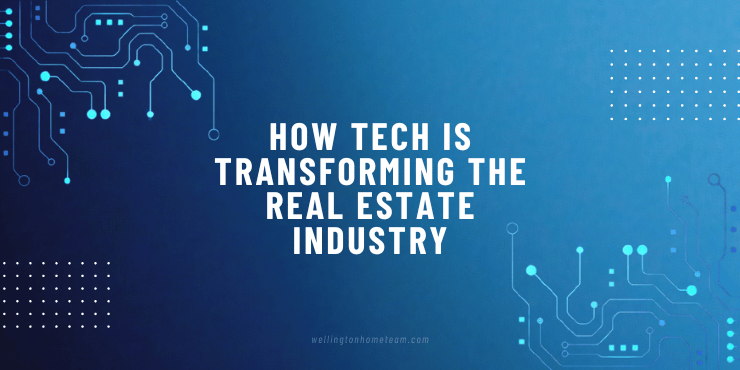How Tech is Transforming the Real Estate Industry
Modern technologies are driving a significant shift in the real estate sector, which was once thought to be a stronghold of traditional business practices. From AI to blockchain, virtual reality to big data, these amazing innovations are changing up every part of the industry. Let’s take a closer look at how technology is transforming real estate and discuss implications for buyers, sellers, investors, and business leaders.

The Digital Revolution in Property Search and Marketing
No more wasting time flipping through newspaper ads or cruising around neighborhoods looking for apartments for rent or houses for sale. These days, looking for a property is all about going digital. People are turning to online platforms and mobile apps as their primary sources for buying or renting. Recent data from the National Association of Realtors shows that 44% of new homeowners check out properties for sale online first, before looking anywhere else. This change has really transformed the way properties are marketed and discovered.
Virtual and Augmented Reality: Reimagining Property Viewings
The integration of virtual and augmented reality is among the most fascinating technological developments in real estate. These technologies are changing how prospective buyers see properties by providing immersive experiences that go much beyond conventional images or videos.
With virtual reality (VR), you can check out properties from all angles, no matter where you are in the world. This is super helpful for buyers or investors checking out properties in remote locations. VR tours are very detailed, letting you inspect every little corner of a home or commercial space as if you are physically present there.
Augmented reality (AR) integrates digital info right on top of the real world. In real estate, this could mean using a smartphone app to check out how different furniture setups would look in a room or seeing how a property might turn out after some planned renovations. AR is totally changing the game for how we evaluate properties, making it far more interactive and visual.
These technologies really make a difference. They save time and resources by cutting down on physical viewings and also widen the pool of potential buyers, making remote property buying easier and more interesting.
Artificial Intelligence and Machine Learning: Smarter Decision-Making
AI and machine learning are totally changing the game for data analysis and decision-making in real estate. Market trends, property valuations, and investment risk assessments are all being improved by these technological advancements.
Large volumes of data, such as past sales data, economic indicators, demographic patterns, and even sentiment on social media, can be analyzed by AI-powered algorithms to produce insights that are difficult for people to manually determine. This is helping investors make smarter choices, giving lenders and appraisers more precise property valuations, and allowing real estate agents to market more effectively.
AI, for instance, can assist in identifying neighborhoods that are anticipated to have gains in property values in the upcoming years, enabling investors to allocate their funds more wisely. It can also help property managers figure out the best rental prices based on current market conditions and demand forecasts.
Blockchain: Enhancing Transparency and Efficiency
Blockchain technology, which you probably know from Bitcoin and other cryptocurrencies, is getting many innovative uses in real estate. Blockchain is extremely useful for keeping track of property transactions. It cuts down on fraud and makes the whole process of transferring property more efficient.
Smart contracts, which are self-executing contracts with the agreement’s terms put directly into code, are especially promising. From rent collecting to fund release upon achievement of agreed-upon criteria, these agreements can automate many facets of real estate transactions. This automation lessens the need for middlemen, hence cutting prices and accelerating procedures.
Internet of Things (IoT): Smart Properties
The Internet of Things is powering up buildings, making them smarter, more efficient, and better at responding to what people need. From thermostats that learn your preferences to security systems that can be operated remotely, smart home technologies are proliferating in residential buildings.
IoT sensors can track anything from energy use to occupancy rates in the commercial real estate industry, therefore enabling more effective property management. By optimizing heating, cooling, and lighting systems, this data can help to lower energy expenditures and increase sustainability.
Big Data and Analytics: Unlocking Insights
From property listings and sales records to demographic data and economic indicators, the real estate industry generates enormous volumes of data. Big data analytics tools are enabling industry experts to make sense of this data in ways not imaginable previously.
These analytics let real estate brokers more precisely focus their marketing activities, help developers understand market demand, and expose trends and patterns that guide investment decisions. Analytics, for instance, can find relationships between specific property characteristics and better sale prices, therefore enabling agents and sellers to maximize their listings.
Also, predictive analytics is being used to predict market trends, which helps investors and developers make smarter choices about where and when to invest. This data-driven approach is cutting down risks and improving returns all over the industry.
Mobile Technology: Real Estate in Your Pocket
Smartphones are everywhere, and they’ve really changed the way people deal with the real estate market. You can now use mobile apps to look for properties, set up viewings, apply for mortgages, and even sign documents, all right from your mobile device.
Recent stats from the National Association of Realtors show that 73% of buyers are using their phones or tablets when searching for a home. This mobile-first approach is totally shifting how people think about speed and convenience in real estate transactions. The demands of today’s tech-savvy clientele are better met by agents and brokers who embrace mobile technologies.
The Future of Real Estate Technology
Looking ahead, it is quite evident that the real estate sector will rely even further on technology. Emerging technologies that offer faster and more dependable internet connections, will improve IoT device capabilities and enable even more realistic virtual reality experiences.
Artificial intelligence is probably going to get even more advanced, maybe automating many of the chores real estate agents now handle. This could cause notable shifts in the business structures and manpower of the sector.
These technologies’ combined integration is drastically affecting the nature of properties themselves rather than only how real estate transactions are carried out. The idea of “smart cities,” in which urban infrastructure is linked and driven by data, could reshape what we value in real estate.
Final Thoughts
The real estate sector is clearly undergoing a technology revolution that presents both possibilities and challenges. These developments promise more information, more convenience, and maybe less expenses for renters and buyers. Adopting these technologies is becoming crucial for industry experts if they want to stay competitive in a fast-changing environment.
The most successful real estate players going forward will be those who can efficiently use these technological developments while still offering the personal touch, still absolutely vital in what is often the most important financial choice people make. Real estate’s future is surely high-tech, but it’s also likely to be more transparent, efficient, and accessible than it has ever been.
Frequently Asked Questions
Q: How can I protect my personal data when using real estate technology platforms?
A: Although data privacy is becoming more and more important, most reputable companies put robust security measures in place to safeguard user data. Search for businesses following industry standards including GDPR or CCPA. Share your private data carefully as well; steer clear of clicking on dubious links or downloading attachments from unknown sources.
Q: What are the potential risks associated with relying too heavily on technology in real estate?
A: Overreliance on technology might reduce human interaction and personal touch in the transaction of real estate. One must find a balance between the value of human expertise and advances in technology. Additionally, technological failures or disruptions can have an influence on operations and customer satisfaction.
Q: How can small real estate businesses benefit from these technological advancements?
A: A small real estate company can use affordable technological resources to challenge larger businesses. Virtual tours, cloud-based platforms, and AI-powered solutions can assist them to reach a larger audience, simplify processes, and increase efficiency. Partnerships with PropTech startups can also offer access to innovative concepts.
Please consider spreading the word and sharing; How Tech is Transforming the Real Estate Industry
Explore how technology is transforming the real estate industry with innovative tools and advancements that makes buying or selling a home easier. #realestate #technologyAbout the Author
Top Wellington Realtor, Michelle Gibson, wrote: “How Tech is Transforming the Real Estate Industry”
Michelle has been specializing in residential real estate since 2001 throughout Wellington Florida and the surrounding area. Whether you’re looking to buy, sell or rent she will guide you through the entire real estate transaction. If you’re ready to put Michelle’s knowledge and expertise to work for you call or e-mail her today.
Areas of service include Wellington, Lake Worth, Royal Palm Beach, Boynton Beach, West Palm Beach, Loxahatchee, Greenacres, and more.

 Michelle Gibson of the Hansen Real Estate Group Inc is a full-time REALTOR who has been specializing in Wellington Florida real estate since 2001. This veteran of the real estate industry has expertise in technology, marketing, and social media.
Michelle Gibson of the Hansen Real Estate Group Inc is a full-time REALTOR who has been specializing in Wellington Florida real estate since 2001. This veteran of the real estate industry has expertise in technology, marketing, and social media.